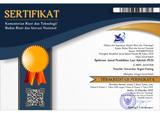The Relationship Between Parental Support and Learning Outcomes For Social Studies Package B At SPNF SKB Bukittinggi City
 ), Irmawita Irmawita(2),
), Irmawita Irmawita(2), (1) Universitas Negeri Padang
(2) Universitas Negeri Padang
 Corresponding Author
Corresponding Author
DOI : https://doi.org/10.24036/spektrumpls.v12i1.127311
Full Text:
 Language : en
Language : en
Abstract
The background to this research is the low social studies learning outcomes of residents studying package B. The aim of this research is to see a picture of the family environment of study residents, see a picture of social studies learning outcomes of residents studying package B, and see a picture of social studies learning outcomes of residents studying package B. The relationship between the family environment and Social Sciences learning results package B at SPNF SKB Bukittinggi City. This research uses a correlational quantitative approach. The population of this study was residents studying package b at SPNF SKB Bukittinggi City, totaling 45 people. Meanwhile, samples were taken from 60% of the population, namely 27 people, using a cluster random sampling technique. Data collection techniques using questionnaires. Data analysis techniques using percentage formulas and Spearman rank formulas. The research results show (1) the family environment is still not good, (2) student learning outcomes are still relatively low, (3) there is a relationship between the family environment and social studies learning outcomes package b, this relationship is declared significant because it is categorized as very strong. It is recommended that parents provide support in education in the family environment in order to optimize student learning outcomes. The SPNF SKB Institute is able to provide motivational support to learning residents and be creative in using learning media so that learning enthusiasm can increase among learning residents. Future researchers can identify characteristics or other variables that have not been examined in this research for further follow-up.
Keywords: Family Environment, Learning Outcomes
References
Deona, S. (2020). Rebuilding Children’s Love of Traditional. Spektrum Jurnal Pendidikan Luar Sekolah, 8(2), 201–206. https://doi.org/10.24036/spektrumpls.v8i2.108667
Hasbullah, M. (2016). Kebijakan Pendidikan dalam Persfektif Teori, Aplikasi dan Kondisi Objektif Pendidikan di Indonesia. Raja Grafindo Persada.
Irmawita, I. (2018). Pengelolaan Program Pendidikan Nonformal untuk Kelompok Masyarakat Lanjut Usia. KOLOKIUM: Jurnal Pendidikan Luar Sekolah, 6(1), 1–8. https://doi.org/10.24036/kolokium-pls.v6i1.2
Kristin, F. (2016). Efektivitas Model Pembelajaran Kooperatif Tipe STAD Ditinjau dari Hasil Belajar IPS Siswa Kelas 4 SD. SCHOLARIA, 6(2).
Oktavia, G., Wisroni, W., & Syuraini, S. (2018). Hubungan antara Kepuasan Kerja dengan Kinerja Tutor Paket C di PKBM Karang Taruna Kembang Delima. KOLOKIUM: Jurnal Pendidikan Luar Sekolah, 6(1), 54–64. https://doi.org/10.24036/kolokium-pls.v6i1.6
Putri, N. E., Nirwana, H., & Syahniar, S. (2018). Hubungan Kondisi Lingkungan Keluarga dengan Hasil Belajar Siswa Sekolah Menengah Atas. JPGI (Jurnal Penelitian Guru Indonesia), 3(2).
Rahayu, S. (2016). Hubungan Lingkungan Keluarga Terhadap Hasil Belajar Sosiologi di SMA Negeri 16 Padang. Jurnal Ilmu Sosial Mamangan, 5(1), 50–59.
Sheridan, S. M., Knoche, L. L., Kupzyk, K. A., Edwards, C. P., & Marvin, C. A. (2011). A Randomized Trial Examining the Effects of Parent Engagement on Early Language and Literacy: the Getting Ready Intervention. Journal of School Psychology, 49(3).
Slameto, S. (2010). Belajar dan Faktor-Faktor yang Mempengaruhinya. Rineka Cipta.
Sunarti, V. (2014). Peranan Pendidikan Luar Sekolah dalam Rangka Mitigasi Bencana. SPEKTRUM: Jurnal Pendidikan Luar Sekolah (PLS), 2(2), 31–41.
Sutarto, J. (2008). Identifikasi Kebutuhan dan Sumber Belajar Pendidikan Nonformal. UNNES Press.
Undang-Undang Nomor 20 Tahun 2003 Tentang Sistem Pendidikan Nasional.
Yusuf, A. M. (2014). Metode Penelitian; Kuantitatif, Kualitatif, dan Penelitian Gabungan. Prenademia Group.
 Article Metrics
Article Metrics
 Abstract Views : 91 times
Abstract Views : 91 times
 PDF Downloaded : 22 times
PDF Downloaded : 22 times
Refbacks
- There are currently no refbacks.

This work is licensed under a Creative Commons Attribution-NonCommercial 4.0 International License.



